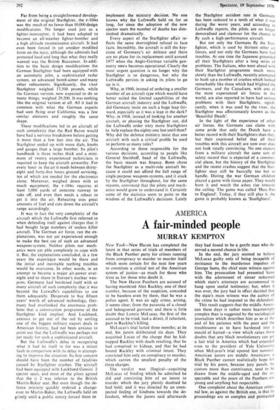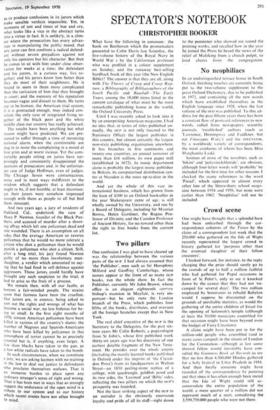AMERICA
A fair-minded people
MURRAY KEMPTON
New York—New Haven has completed the latest in that series of trials of members of the Black Panther party for crimes running from conspiracy to murder to murder itself which seem certain for the next few years to constitute a critical test of the American system of justice—as much for those who trust as for those who doubt it.
The New Haven Panthers are accused of having murdered Alex Rackley, one of their number, because of the suspicion, conceded to be baseless even by them, that he was a police agent. It was an ugly crime, arising, it seems clear, from the paranoia of a closed and beleaguered garrison; and there is little doubt that Lonnie McLucas, the first of the accused to be tried, had a direct, if reluctant, part in Rackley's killing.
McLucas's trial lasted three months; at its end, his jurors deliberated six days. They acquitted Lucas of the charge that he kid- napped Rackley with death resulting, that he had conspired to kidnap, and that he had bound Rackley with criminal intent. They convicted him only on conspiracy to murder, which carries the smallest penalty of the three charges.
The verdict was illogical—acquitting McLucas of binding which he admitted he did and convicting him of an intent to murder which the jury plainly doubted he had held; and it was directed by an unex- pected feeling of kindness towards the de- fendant, whom the jurors said afterwards they had found to be a gentle man who de- served a second chance in life.
In the end, the jury seemed to believe McLucas guilty only of being incapable of resistance to the murderous impulses of George Sams, the chief state witness against him. The prosecution had presented Sams with the adornment of sinner redeemed which state's attorneys are accustomed to hang upon useful testimony; but, when it was over, the jury had in effect decided that the state's main witness was the author of the crime he had imputed to the defendant.
This result suggests that the middle Ameri- can these days is rather more hearteningly complex than is suggested by the sociological journalism which describes him as so at the end of his patience with the poor and the troublesome as to have hardened into a mould of hatred—a view which raises those doubts that any black revolutionary can get a fair trial in America which had extended even to the president of Yale University when McLucas's trial opened last summer. American jurors are middle Americans; a Black Panther cannot realistically hope for trial by his peers, because jury panels, by custom more than contrivance, tend to be drawn from the middle-aged and the re- spectable and the peers of the Panthers are young and anything but respectable.
One complaint about the American crimi- nal law, as against the British one, is that its proceedings are so complex and protracted as to produce confusions in its jurors which make sensible verdicts impossible. Yet, in moments of test and times of hue and cry, what looks like a vice in the abstract turns into a virtue in fact. It is unlikely, in a clim- ate where the prosecution has every advan- tage in manipulating the public mood, that any juror can first confront a radical defend- ant without severe prejudices against not only his opinions but his character. But then he comes to sit with him under close obser- vation for weeks at a time; the defendant and his jurors, in a curious way, live to- gether; and his jurors know him better than they do most of their neighbours. He is bound to seem to them more complicated than the caricature of him that they brought to court; and the memory of his reputation becomes vague and distant to them. He turns out to be human; the American trial system, if it is protracted enough, may indeed con- stitute the only case of integrated living to- gether of the black poor and the white middle class our country has really achieved.
The results have been anything but what reason might have predicted. We are pre- sumed to suffer through a time of mounting national alarm, when the comfortable are dug in to resist the complaining in a mood at best grim and at worst vicious. Yet the com- fortable people sitting on juries have sur- prisingly and consistently disappointed the passions of prosecutors and, in the unfortun- ate case of Judge Hoffman, even of judges. The Chicago Seven were contumacious, noisy and in most ways indifferent to the wisdom which suggests that a defendant ought to be, if not humble, at least decorous; yet their jurors were somehow impressed enough with them as people to all but find them innocent.
And two years ago, a jury of residents of Oakland, Cal., undertook the case of Huey P. Newton, founder of the Black Pan- thers, and accused of murder after a shoot- ing affray which left one policeman dead and one wounded. There is an assumption on all sides that the average American so reveres policemen that he would no more tolerate a citizen who shot a policeman than he would punish a policeman who shot a citizen. Still, after a long trial, his jury found Newton guilty of no more than involuntary man- slaughter, a verdict which amounted to say- ing that he had fired in self-defence against aggressors. These jurors could hardly have brought any such suspicion to the trial; it had to arise as the fruit of a process.
We remain then, with all our faults, at bottom a fair-minded people. The strains upon that fairness have been the cruellest. Our jurors are, in essence, being asked to sort out the rights and wrongs of what has become a social war, no less hideous for be- ing so small. In the first eight months of 1970, sixteen American policemen have been killed in various of the country's slums; the number of Negroes and Spanish-Americans who have been killed by policemen in this atmosphere of terror cannot be as precisely counted but is, if anything, even larger. A few slum blacks have taken to the gun, as a few white radicals have taken to the bomb.
In such circumstances, when we constitute jury, ury, we are asking laymen with no training
in the law to deal out justice to defendants who proclaim themselves outlaws. That is immense mmense burden to place upon any ordinary stranger's sense of right and wrong. That it has been met in ways that so strongly suggest the endurance of the open mind is a tribute to our system and to our history which recent events have not often brought to mind.



































 Previous page
Previous page